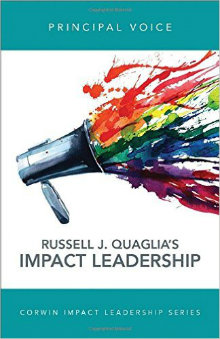Effective Principals Must Listen, Learn & Lead
Principal Voice: Listen, Learn, Lead
By Russell J. Quaglia
(Corwin, 2016 – Learn more)

Why should school leaders care about this book?
I wanted to review Dr. Quaglia’s book for two reasons:
- I was intrigued by the number of pages (57 total pages to be exact), not because I wanted to review the smallest book that MiddleWeb had on their review list, but because I wanted to see what one could accomplish in such a small space (by the way: the book also measures 5.5 X 8.5 inches so it really is small).This book, among others published by Corwin as part of their impact series, seems intended to compete with ASCD’s Arias Collection.These kinds of brief books (Hack Learning is another example) are meant to provide practical, user-friendly tips, take-aways, or ideas that educators can implement right away without waiting until the conclusion of a 400-page brick of cheese.
- I am a former principal and work with principals all across the nation. The audience and topic appeared to be important and interesting to me.

What’s in the book
Quaglia’s career has been devoted to research and practice in the thematic area of advocating for students’ and educators’ voices. This book takes advocating for a principal’s voice and provides a very creative framework for things that we know are good leadership practices but may have forgotten or stored into our subconscious minds.
In other words, Quaglia’s tips and take-aways are not necessarily groundbreaking, but they are thoughtful, reflective, and easy to implement.
From “flipping your faculty meetings” to “serving coffee and donuts” to “reaching out to community organizations,” these topics might not seem all that innovative. However, Quaglia sets up each chapter under the categories of Listen, Learn, and Lead and then includes reflective questions, along with a section entitled “Principal Volume Controls” for working with students, teachers, parents, and the community.
These “Volume Controls” further define what Listen, Learn, and Lead really mean for a principal working with each of these groups. What can we decrease doing (i.e. writing internal memos to staff) and increase doing (i.e. writing journal articles, blogs, or books that promote your vision and values) as we turn up our own volume knob for carrying out what matters most?
The Framework of the Three “L’s”
Each one of Quaglia’s practical tips fits in to the foundation of his three “L’s”:
Listen = Not a passive act, but taking a genuine interest. Don’t just “take it in,” but know that there is an underpinning plotline or point that will help you to learn and then advocate with voice as you lead. Synthesize the information you receive.
Learn = Not a polite gesture where we just humor others by paying attention, but figuring out what we can learn from everything shared with us.
Lead = Advocating positive leadership through voice. Voice = Being open, honest, and strong.
This framework is simple, not overly ornamented with theory, and it, just plain and simple, works.
Powerful quotes
Quaglia also shares the “spice,” openness, and honesty that his grandmother’s wisdom has provided to him over the years as he shares powerful quotes throughout the book to illustrate how voice can assist with leading. This is a highly creative and reflective touch, and the quotes add a nice humanistic feel to the book.
Without sharing all of the tips or take-aways with you, I found that Dr. Quaglia’s framework brings that which is stored in the subconscious out into the conscious mind. I can see myself carrying out student perception surveys or making classroom visitations that do not focus on walk-throughs or annual performance plans.
I can also see myself shadowing a student twice a year as means to accomplish the three L’s in a way that would give me a conscious leadership voice in any school today.
Rick Jetter, Ph.D. is a national educational consultant, author, and book writing counselor. He is also a former middle school ELA teacher, assistant principal, principal, assistant superintendent, and superintendent of schools. He is the author of Hiring the Best Staff for Your School and other books. Visit http://www.rickjetter.com for more information.





































Good review. I like that the book is small and the grandmother’s wisdom quotes, especially.